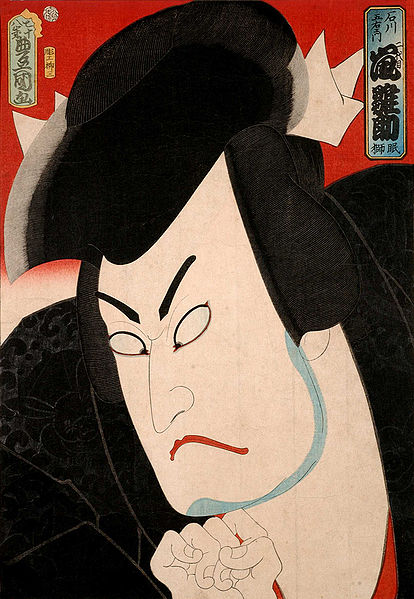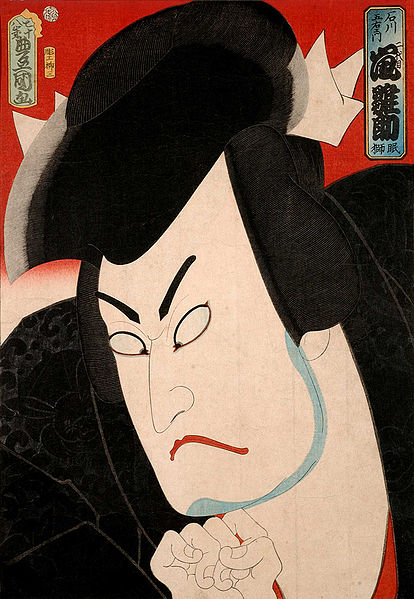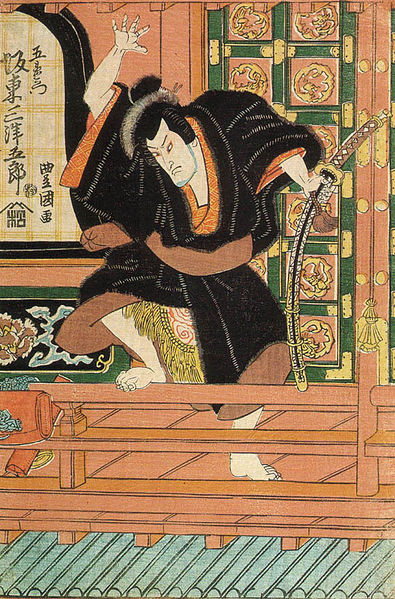
Ishikawa Goemon: Japan’s Legendary Outlaw
Ishigawa Goemon  (石川 五右衛門; 1558 – 1594) was a legendary Japanese outlaw. He was looked upon as a hero who stole gold and other valuables and gave them to the poor. His story lives on in contemporary Japanese pop culture; he is considered a a folk hero by many.
(石川 五右衛門; 1558 – 1594) was a legendary Japanese outlaw. He was looked upon as a hero who stole gold and other valuables and gave them to the poor. His story lives on in contemporary Japanese pop culture; he is considered a a folk hero by many.
The 16th century saw sengoku daimyos constantly fighting each other. This resulted in fewer daimyos emerging from local wars and others expanding their lands. This prompted Oda Nobunaga, one of the major daimyos, to initiate the unification of Japan under the shogunate that had a decisive military conquest.
Poster of kabuki actor Hinasuke Arashi as Goemon Ishikawa.
His vision was continued by Toyotomi Hideyoshi and ended with Tokugawa Ieyasu. This era saw daimyos and their territories organized into domains (han) and were rated based on how much rice they produced and their ties to the ruling Tokugawa family.
It is believed that in 1558, Ishikawa Goemon was born as Sanada Kuranoshin to a samurai family in the service of the powerful Miyoshi clan of Iga Province. Supposedly, Ishikawa Goemon’s father, Ishikawa Akashi, was killed by the men of the Ashikaga shogunate. Goemon, then 15 years old, swore to avenge his father’s death and began training in the arts of Iga ninjutsu under the tutelage of Momochi Sandayu (Momochi Tamba). When Goemon’s master found out that Goemon was having an affair with one of his mistresses, Goemon moved to neighboring Kansai region where he formed and led a band of bandits and thieves. Eventually he took the name Ishikawa Goemon, started robbing rich feudal lords, clerics, and merchants, and gave his spoils to the poor.
There is not much historical information on the life of Ishikawa Goemon and very little facts are recorded, but many believe accounts that have been passed on through the years.The earliest mention of Ishikawa Goemon appears in the 1642 biography of Toyotomi Hideyoshi. In Hideyoshi’s biography, Goemon is referred to as a thief. As the legend of Goemon became more popular, he was credited with the more notable anti-authoritarian exploits in Japan’s history. Some of these include the assassination attempts against the Oda clan, Oda Nobunaga, and Toyotomi Hideyoshi himself.
Poster of actor Bandō Mitsugorō III playing the role of Ishikawa Goemon.
Ishikawa Goemon was later captured by Japanese authorities, and his death resounds in the annals of history by its gruesomeness. He was boiled alive along with his son in public after his botched attempt to assassinate the civil war-era warlord, Toyotomi Hideyoshi.

